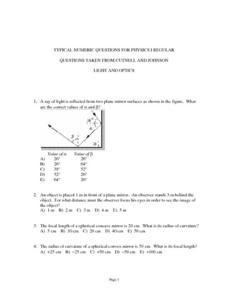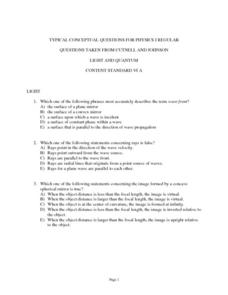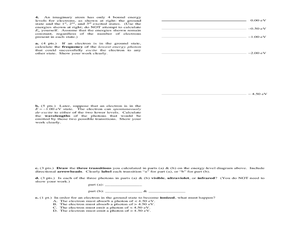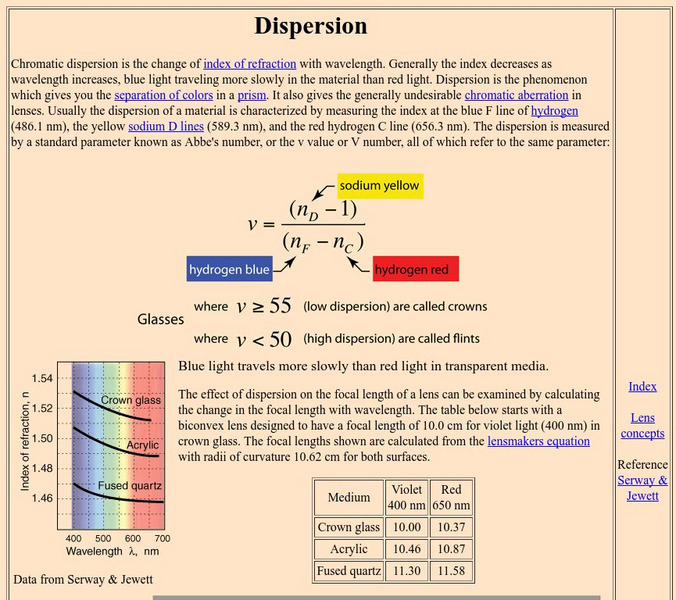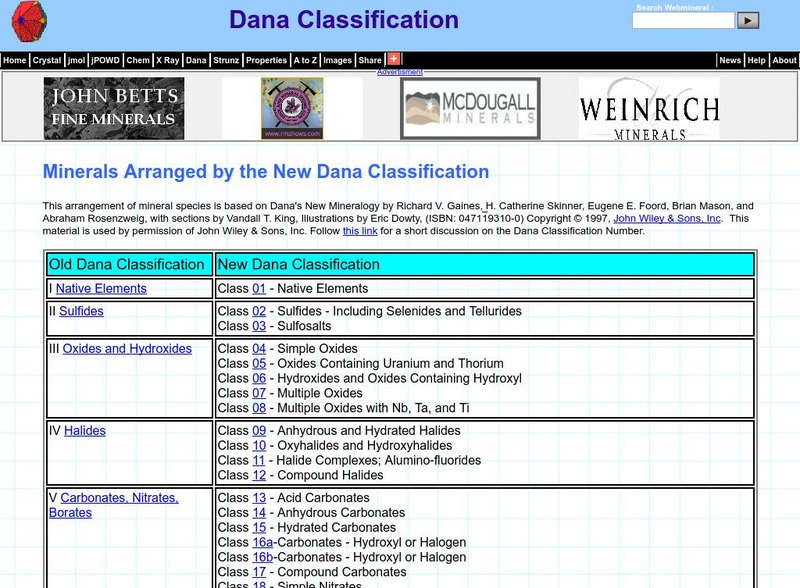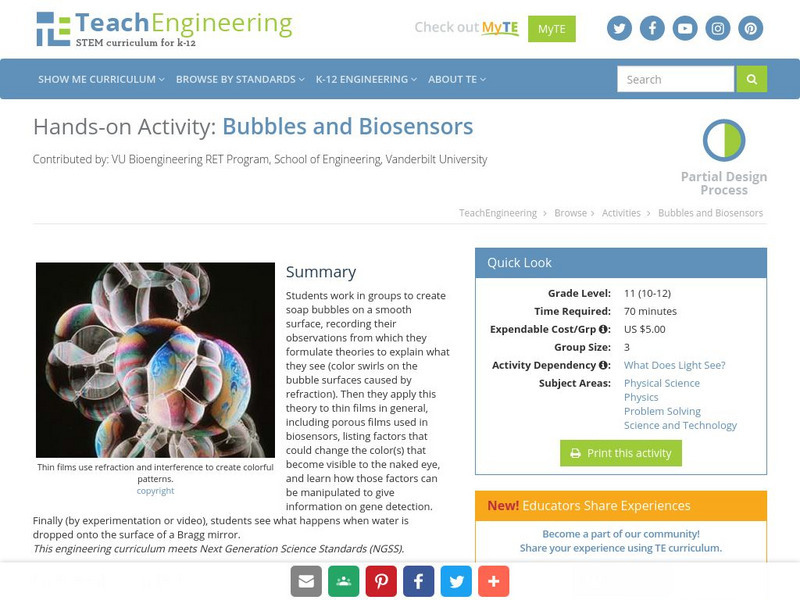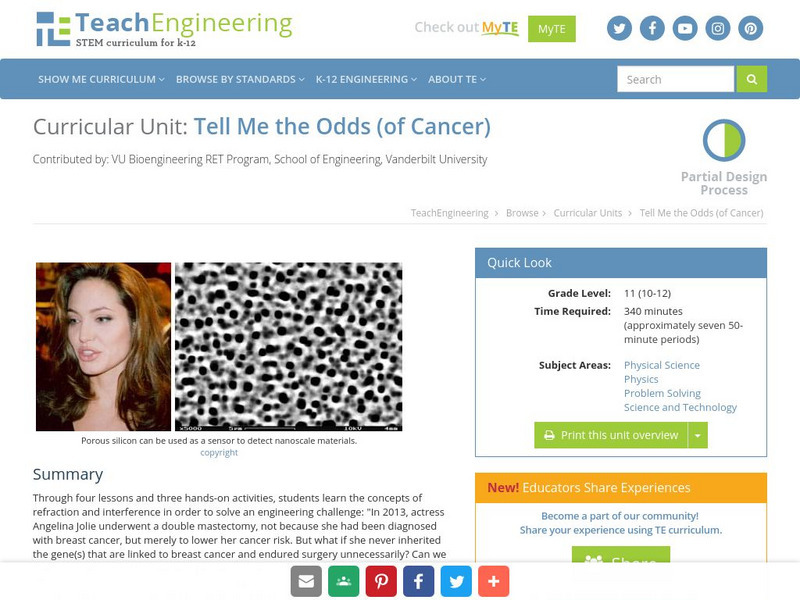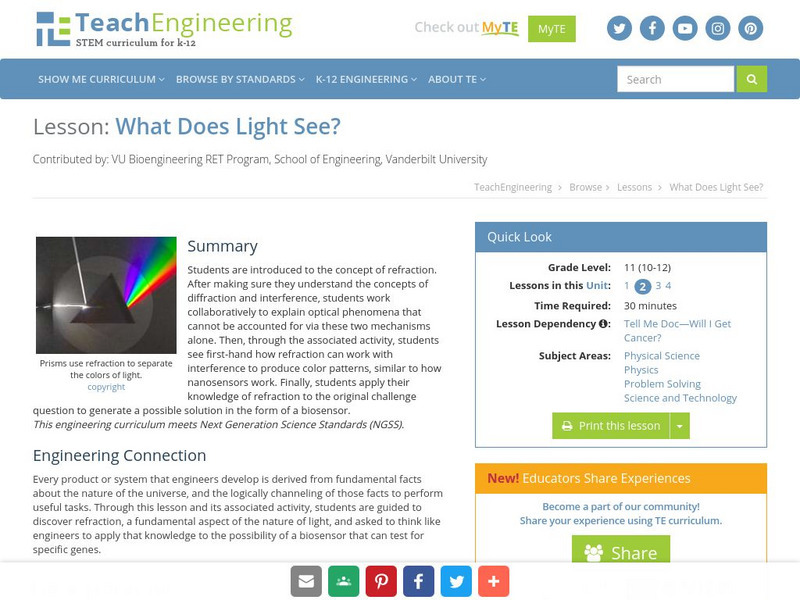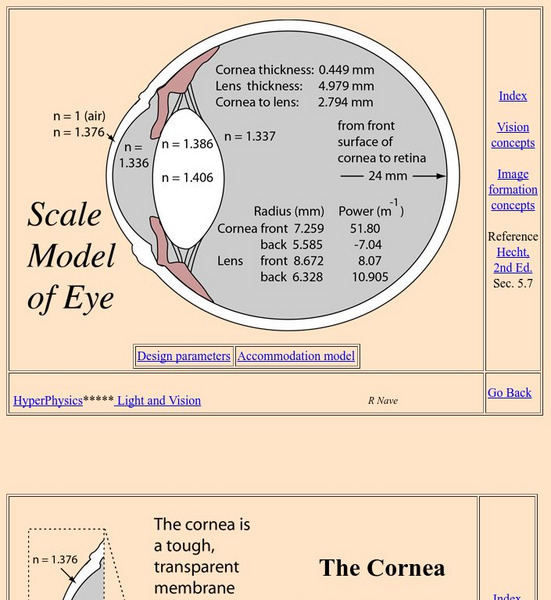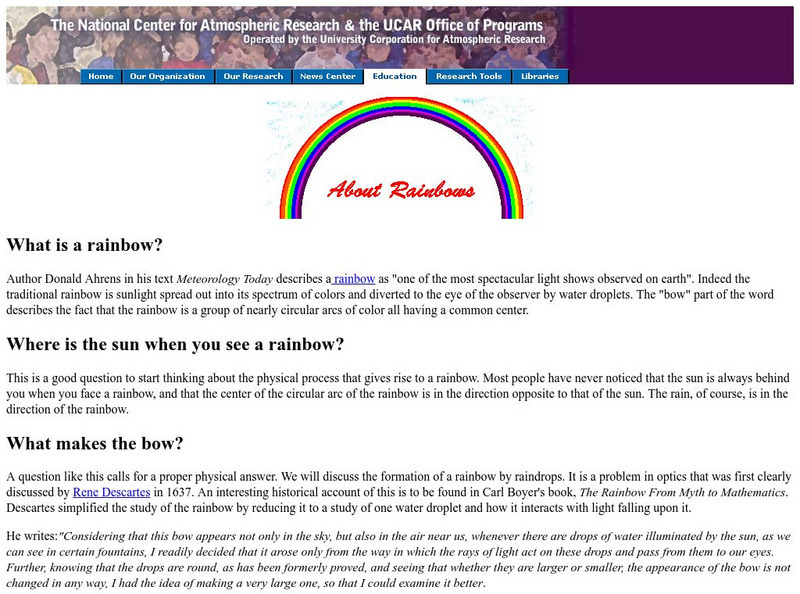Curated OER
Typical Numeric Questions for Physics I - Light and Optics
Nineteen word problems dealing with frequency, speed, reflection, and refraction of light are provided here. Empower your physics masters to manipulate equations for computing angles, focal lengths, image heights, and more! This is a...
Curated OER
Typical Conceptual Questions for Physics I - Light and Quantum
This is a stellar overview of everything light and quantum! There are 30 multiple choice questions, none of them requiring any mathematical computation. There are a few diagrams to analyze: light rays striking reflective and refractive...
Curated OER
Regents High School Examination - Physics 2010
Give every type of learner in your physics class an opportunity to demonstrate what they have learned throughout the year. From analyzing tables and graphs, to evaluating diagrams and solving problems, there is an outstanding variety of...
Curated OER
Physics 152 ~ Fall 2003 Midterm Exam #3, Parts A, B
Illuminated physics stars show what they know about light by taking this exam. They match several related vocabulary terms to descriptions and answer multiple choice questions about the characteristics of light, magnification, and...
Curated OER
Take-Home Midterm Exam #3, Part A
Let your physics learners take this electromagnetic radiation exam home to show what they know. You could also use it in class or assign it as a review. The content covers concepts pertaining to color, wavelength, frequency,...
Curated OER
Physics Final Exam, Part A
Here is a comprehensive and cohesive final exam for your high school physicists. A variety of question styles are incorporated, such as multiple-choice and problem-solving. Topics are too many to list, so you will want to review the exam...
Curated OER
Super Gelatin
Students investigate the refraction properties of gelatin to calculate its index of refraction. They discover that as the light travels through the gelatin, its speed and wavelength also change. Students find th indes of refraction of an...
Curated OER
Refraction Through a Circular Disk
In this refraction through a circular disk worksheet, high schoolers are given a diagram of a circular disk of leaded glass with light striking it. Students use the diagram to find the angle of incidence of the light, the angle of...
Florida State University
Florida State University: Molecular Expressions Microscopy Primer: Light and Color Refraction of Light
Comprehensive and sophisticated overview of light refraction includes an historical overview of the subject and explanations of the mathematics that underpin refractive indexes, the relative index of refraction, Snell's law, and light...
Georgia State University
Georgia State University: Hyper Physics: Refraction of Light and Snell's Law
The meaning and cause of refraction--as well as Snell's law of refraction--are discussed. Includes an interactive problem-solving form in which visitors relate angles of refraction to the incident angle and the indices of refraction.
Georgia State University
Georgia State University: Hyper Physics: Dispersion
The phenomenon of light dispersion is explained with a formula and a practice form for calculating Abbe's number.
Other
New Dana System Mineralogy Database
Over 3,900 mineral species descriptions are included in this HTML-linked table of Dana classifications for all known valid mineral species. 3-D models are available for over 600 minerals.
Georgia Department of Education
Ga Virtual Learning: Geometric Optics
This interactive unit will help students to understand the basics of geometric optics. Learn what happens when light strikes the boundary between two media as well as the difference between a real and virtual image? Also explore the law...
TeachEngineering
Teach Engineering: Bubbles and Biosensors
Students learn that color swirls on the bubble surfaces are caused by refraction. Then they apply this theory to thin films in general, including porous films used in biosensors, listing factors that could change the color that become...
TeachEngineering
Teach Engineering: When Silicon Talks
In this activity, students tackle this aspect of engineering as they solve problems for precise angles and speeds, and predict data output when samples are altered.
TeachEngineering
Teach Engineering: Show Me the Genes
In this activity, students create posters which explain and illustrate thin film refraction and the factors that influence it. The goal is to explain the experimental results of using an optical biosensor, and prove these results with a...
TeachEngineering
Teach Engineering: Tell Me the Odds (Of Cancer)
A seven-lesson unit where students learn the concepts of refraction and interference in order to solve this engineering challenge: In 2013, actress Angelina Jolie underwent a double mastectomy, not because she had been diagnosed with...
TeachEngineering
Teach Engineering: What Does Light See?
Students are introduced to the concept of refraction. After making sure they understand the concepts of diffraction and interference, students work collaboratively to explain optical phenomena that cannot be accounted for via these two...
TeachEngineering
Teach Engineering: Quantifying Refraction
Students learn the relevant equations for refraction (index of refraction and Snell's law) and how to use them to predict the behavior of light waves in specified scenarios.
Georgia State University
Georgia State University: Hyper Physics: Scale Model of Human Eye
A scale model of the human eye is shown. Information about the parts of the eye and the common defects that result from its malfunctioning.
University Corporation for Atmospheric Research
Ucar: About Rainbows
This site from the University Corporation of Atmospheric Research provides an illustrated article about the phenomenon of rainbows.
University of Minnesota
University of Minnesota: Refraction of Light
This page is a continuation of a tutorial about light reflection and refraction. It contains a diagram and suggestions on how to derive Snell's Law, which governs the refraction of light in a medium. For background to this derivation,...
Physics Classroom
The Physics Classroom: Optical Density and Light Speed
A tutorial page explaining how the speed of light is dependent upon the optical density of the material through which it moves. Optical density is related to the index of refraction; sample values are given.
Other
The Disgustoscope
This is a resource to teach optics, while building a modified kaleidoscope that will provide 3-dimensional images.


